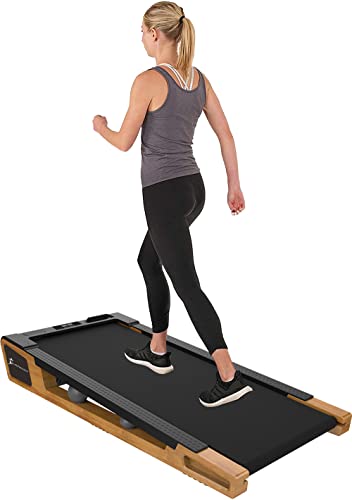Discovering the Manual Incline Treadmill: A Comprehensive Guide
As the physical fitness industry constantly develops, with new gizmos and makers striking the marketplace, one piece of devices has stayed a staple in many homes and health clubs: the treadmill. Particularly, Manual Treadmill For Under Desk provides a special approach to cardiovascular physical fitness training. This guide looks into the functions, advantages, and considerations of utilizing a manual incline treadmill.
What is a Manual Incline Treadmill?
A manual incline treadmill is a non-motorized treadmill that needs users to power their motion by walking or operating on the belt. Unlike traditional treadmills, which rely on electrical power to move the belt, manual incline treadmills depend entirely on the user's energy. The incline setting, which can be changed, assists replicate uphill running, supplying a reliable exercise.
Key Features of Manual Incline Treadmills
| Function | Description |
|---|---|
| Manual Operation | Users need to move the belt themselves, making it a self-paced workout. |
| Adjustable Incline | Incline settings can be changed, offering varied resistance for a harder difficulty. |
| Compact Design | Often more lightweight and compact than motorized treadmills, making them simpler to store. |
| Long lasting Construction | Generally constructed with tough materials, designed to stand up to extensive use. |
| Digital Display | Some designs may include a fundamental digital screen to reveal time, distance, and calories burned. |
Advantages of Using a Manual Incline Treadmill
1. Boosted Cardiovascular Fitness
The manual incline treadmill efficiently raises heart rate, leading to improved cardiovascular health. The incline setting needs more effort from the muscles, consequently increasing the overall workout intensity.
2. Adjustable Workouts
With manual treadmills, users have full control over their speed and incline. This function allows them to personalize exercises to line up with physical fitness goals, whether focusing on endurance building or interval training.
3. Lower Operating Costs
Manual incline treadmills do not require electricity, making them an economical alternative to standard treadmills. This economical aspect interest those wanting to improve their home gym without incurring high energy costs.
4. Engaging Full-Body Workout
Running or walking on an incline engages multiple muscle groups, consisting of the legs, glutes, and core. This total-body activation assists tone and strengthen the body while burning extra calories.
5. Minimized Risk of Injury
The low-impact nature of a manual incline treadmill can be less taxing on the joints compared to high-impact aerobic exercises. However, users must still practice excellent type and begin slowly to minimize the risk of strains or injuries.
Factors to consider When Using a Manual Incline Treadmill
Safety First
While manual incline treadmills have numerous benefits, there are some security factors to consider to keep in mind:
- Falling Hazard: Since users propel the belt themselves, it is very important to maintain a consistent rate to avoid losing balance.
- Incline Levels: Adjusting the incline during usage can be tough and needs mindful attention to maintain stability.
Appropriate Form and Technique
To optimize the advantages while lessening the risk of injury, users must highlight proper running or walking type. This consists of keeping the back straight, shoulders relaxed, and arms in a natural position.
How to Choose the Right Manual Incline Treadmill
Selecting the very best manual incline treadmill is paramount to attaining fitness goals. Below are essential aspects to think about:
| Criteria | Recommendations |
|---|---|
| Weight Capacity | Make sure the treadmill can support your weight; a lot of have capacities varying from 250 to 400 pounds. |
| Adjustability | Look for treadmills with numerous incline settings to offer workout range. |
| Mobility | Consider foldable designs if storage space is restricted. |
| Comfort Features | Look for non-slip surfaces and cushioned running locations to improve convenience. |
Often Asked Questions (FAQ)
1. How do I maintain a manual incline treadmill?
To maintain a manual treadmill, regularly check the belt for wear and ensure it runs smoothly. Tidy the frame and running surface, and examine the bolts and screws for signs of loosening.
2. Is a manual incline treadmill suitable for beginners?
Yes, manual incline treadmills can be appropriate for newbies. Users can begin at a slow rate and slowly increase intensity. However, it's essential to comprehend one's fitness level and start carefully.
3. Can I carry out interval training on a manual incline treadmill?
Absolutely. The adjustable incline function permits users to develop varied workouts, perfect for interval training. Alternate in between walking and performing at various inclines to keep workouts engaging and challenging.
4. Is a manual incline treadmill quieter than a motorized one?
Yes, due to the lack of a motor, manual incline treadmills usually operate more quietly, making them an excellent option for shared spaces.
5. Just how much area do I require for a manual incline treadmill?
Manual incline treadmills normally inhabit less area than motorized models. However, users need to guarantee there's adequate area for movement around the treadmill for safety.
The manual incline treadmill provides a special blend of advantages and versatility, making it an excellent choice for those seeking to enhance their workout routine without counting on electrical power. From enhanced cardiovascular fitness to customizable training choices, it provides a comprehensive method to fitness. By understanding its features, advantages, and security factors to consider, users can select the ideal model and integrate it effectively into their workout routine. Whether utilized in a home fitness center or a larger physical fitness center, a manual incline treadmill can be an indispensable tool for those focused on fitness and health.

